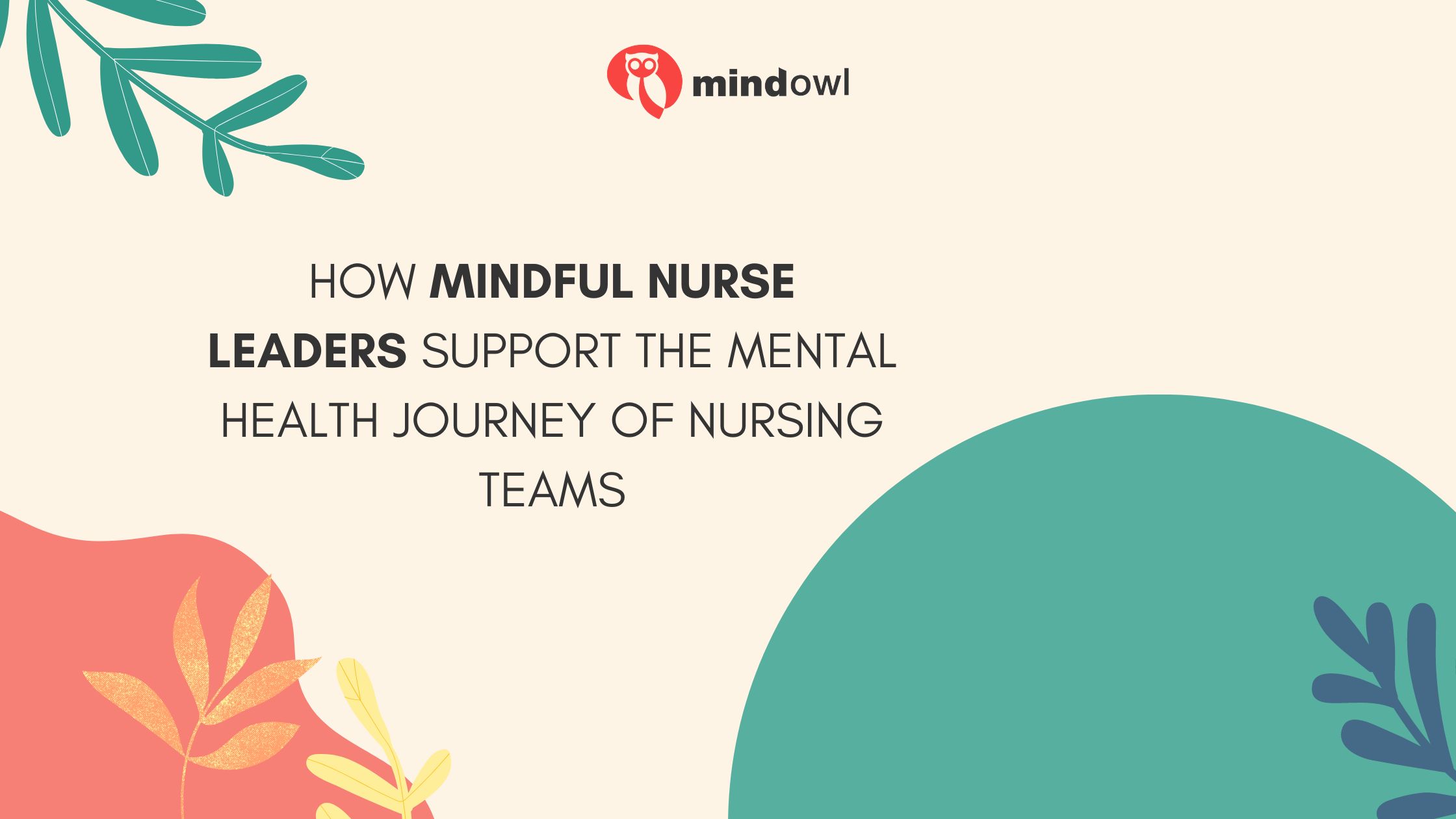Nursing is an incredibly demanding profession, with high rates of burnout, compassion fatigue, anxiety, and depression seen across the workforce. The intense pressures take a tremendous toll on nurses’ well-being.
Nurse leaders have a profound duty to address this crisis and support invaluable yet vulnerable nurses. Mindful leaders can help to create psychologically safe environments where nurses feel heard and cared for. This is where mindful leadership comes in.
Mindful leadership involves tuning into the present moment, connecting authentically with teams, and responding skillfully to complex situations. Mindful leaders can empathise deeply with nurses’ struggles and role model healthy coping strategies and work-life balance, refusing to glorify burnout.
In this article, we will explore how mindful nurse leaders support nurses through workplace stressors – from building resilience through self-compassion to transforming cultures that truly value human well-being over productivity.
Creating a Supportive Environment
Nurse leaders can foster this environment by promoting open communication and empathy among team members. Encouraging regular check-ins and team meetings allows nurses to share their concerns, experiences, and coping strategies. By actively listening and validating their emotions, they can help alleviate stress and build trust within the team.
Providing access to resources and support systems reinforces the supportive environment. Nurse leaders can provide counseling services, mental health workshops, and customized wellness programs to meet the unique requirements of their nursing staff. These endeavors empower nurses to prioritize their mental well-being. They encourage them to seek assistance as necessary and diminish the stigma associated with mental health concerns in the workplace.
Providing Resources and Education
Education equips nurses with the knowledge and skills to effectively understand and manage their mental well-being. Access to mental health workshops, training sessions, and educational materials can help nurses identify signs of burnout. It allows them to develop coping strategies and seek appropriate support when needed. By investing in education, these leaders empower their teams to prioritize self-care and build resilience in workplace stressors.
Investing in education is a cornerstone of effective nursing leadership. Individuals with robust leadership attributes are more adept at addressing the mental health needs of their teams. Such qualities encompass empathy, proficiency in conflict resolution, and a steadfast dedication to evidence-based practices.
Thus, graduate nursing programs offer specialized clinical leadership and nursing education tracks, providing aspiring leaders with opportunities. These programs enhance their skills and knowledge base. Pursuing advanced degrees like a Master of Science in Nursing (MSN) enables nurses to formalize their leadership responsibilities. It makes significant contributions to healthcare systems, states Cleveland State University.
Resources such as counseling services, peer support groups, and wellness programs are essential for creating a supportive environment. Nurse leaders can collaborate with human resources departments and external organizations to ensure access to various mental health resources. These are tailored to the needs of their nursing teams.
They empower their teams by prioritizing education, fostering nursing leadership qualities, and offering access to necessary resources. It allows them to prioritize self-care, build resilience, and thrive in the demanding healthcare environment. Offering these resources, they demonstrate their commitment to supporting the holistic well-being of their teams. It fosters a culture of care and compassion within the workplace.

Encouraging Self-Care Practices
By emphasizing the importance of self-care, nurse leaders empower their team members to prioritize their well-being amidst the demands of their profession.
They can lead by example by practicing self-care and discussing its benefits with their team. By demonstrating a commitment to self-care, they set a positive precedent and encourage their team members to follow suit.
Nurses should prioritize their physical health by getting enough sleep, eating a balanced diet, and exercising regularly. According to PRS Global, stress can be reduced by partaking in hobbies or leisure pastimes that encourage contentment and relaxation. Building a strong social support system is essential for emotional & mental health.
Selecting a nursing organization that puts nurse welfare first might offer more assistance. They may maintain their well-being while giving patients the best care possible by balancing their physical, mental, and emotional demands.
Offering Support and Guidance
Nurse leaders can provide personalized support by regularly checking in with team members, actively listening to their concerns, and offering empathetic guidance. By establishing open lines of communication, they create a safe space for nurses to seek support. Also, it allows them to share their experiences without fear of judgment or repercussion.
These leaders can offer mentorship opportunities to provide additional support and guidance to their team members. Pairing experienced nurses with newer staff allows for knowledge sharing, skill development, and emotional support. Mentorship relationships provide them with a trusted confidant and a valuable source of encouragement and advice. It helps them navigate the challenges of their profession with confidence and resilience.
Advocating for Mental Health Awareness
Nurses need to be aware of mental health issues since they often experience persistent burnout and have limited access to resources. According to a McKinsey & Company survey, 56% of nurses acknowledged the stigma associated with mental health issues. Also, around two-thirds of them acknowledged not getting mental health support.
Financial limitations (10%), self-reliance beliefs (23%), and lack of time (29%) are the main reasons for not getting expert assistance. Remarkably, lack of time was indicated as the main obstacle by 10% of these professionals having ten or fewer years of experience. Fostering their well-being, which results in high-quality patient care, depends on addressing the stigma associated with mental illness. Offering easily available assistance is paramount.
Thus, nurse leaders can raise awareness by initiating conversations about mental health, sharing educational materials, and organizing events to destigmatize mental health issues.
Collaborating with fellow healthcare professionals and organizations enables nurse leaders to advocate for policy reforms. They can champion initiatives geared towards prioritizing mental health in nursing advocating for enhanced access to mental health resources among nursing professionals. Other access may include improved staffing ratios to reduce workload stress and the implementation of mental health training programs for nurses.
By actively engaging in advocacy efforts, they work towards systemic changes that promote the mental well-being of nursing teams.
Celebrating Successes and Recognizing Contributions
Nurse leaders can boost morale and nurture a sense of accomplishment among team members by acknowledging and celebrating their achievements. Recognizing their hard work and dedication validates their contributions to the team.
It is crucial to acknowledge nurses to encourage and promote their mental health. They are acknowledged for their commitment when milestones are celebrated, appropriate compensation is given, and possibilities for growth are provided. According to ANA, burnout and exhaustion are avoided by offering flexible scheduling, wellness initiatives, and a favorable work-life balance.
Peer-to-peer recognition and personalized words of thanks help the team members bond and show respect for one another. Acts of kindness like sending flowers or presents via a “Thank a Nurse” initiative serve to uplift their sense of worth. It fosters a supportive work atmosphere, both of which eventually improve their mental health.
Also, they can create a culture of appreciation by regularly expressing gratitude and acknowledging the contributions of individual team members. This can be done through verbal praise, written notes of appreciation, or public recognition ceremonies. By highlighting their unique skills and strengths, they reinforce a sense of value and belonging within the team, promoting positive mental well-being.
In conclusion, nurse leadership plays a vital role in supporting the mental health journey of nursing teams. By fostering a culture of understanding, appreciation, and support, nurse leaders contribute to a positive work environment. It is where nurses feel valued, motivated, and equipped to navigate the challenges of their profession.
MindOwl Founder – My own struggles in life have led me to this path of understanding the human condition. I graduated with a bachelor’s degree in philosophy before completing a master’s degree in psychology at Regent’s University London. I then completed a postgraduate diploma in philosophical counselling before being trained in ACT (Acceptance and commitment therapy).
I’ve spent the last eight years studying the encounter of meditative practices with modern psychology.

